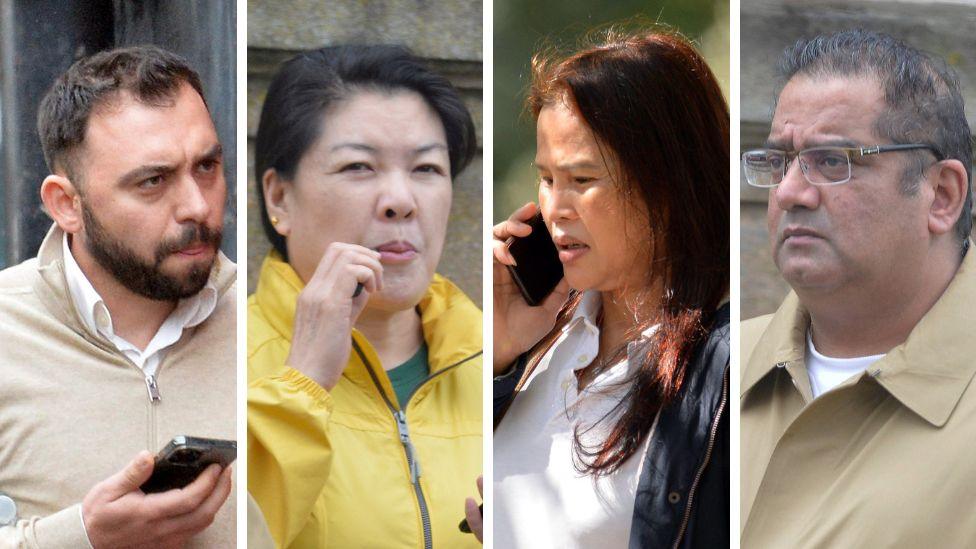The sex traffickers hiding in plain sight
- Published
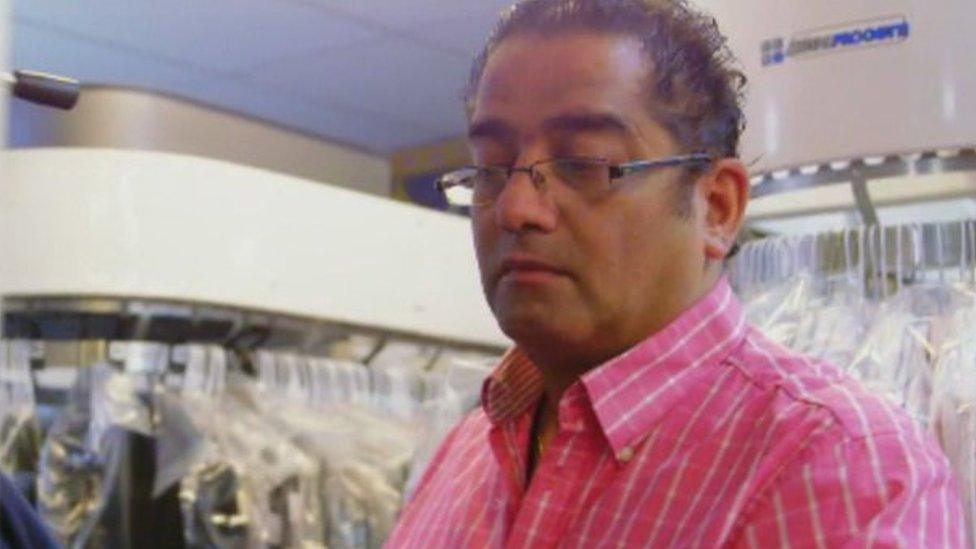
Jagpal Singh owned a dry cleaners when he appeared on reality show Common Sense in 2017
The number of people being reported as potential victims of human trafficking in Scotland has risen to a record high, police have said.
In one high profile case last month a gang of four traffickers were convicted of luring victims from China and Thailand, seizing their passports and forcing them to work in brothels.
One of the traffickers was 52-year-old Jagpal Singh, a man who people in the west end of Glasgow knew well as the owner of a local dry cleaners.
In 2017, Singh had even appeared on the short-lived BBC reality show Common Sense.
He was one of a cast of British people chosen for their humorous takes on current affairs - usually as they worked at their normal jobs.
Singh would be seen in his dry cleaners shop offering his own spin on the news of the day, from Donald Trump's border wall to Patrick Stewart's appearance in The Emoji Movie.
But he also offered his views of relationships. "Men like sex", he said.
"I'm not saying women don't like sex. I think men like sex better. Women are always tired."
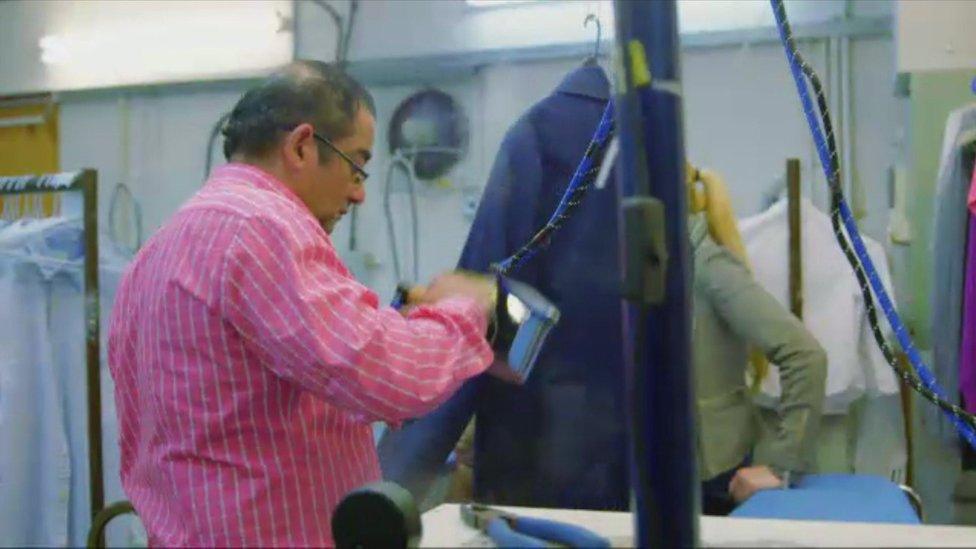
Dry cleaners owner Jagpal Singh was also trafficking women from China to work in brothels across Glasgow
The following year, Singh - who is no longer involved with the dry cleaning business - was trafficking women from China to work in brothels across Glasgow.
He advertised their services online. When they refused to work or complained about their treatment, Singh would threaten to stop feeding them.
During his trial at the High Court in Glasgow, he accused those women of lying.
His new partner and "female boss" of the gang, Dhonglin Zhang, was also involved in the scheme.
Zhang had claimed to once be a victim of human trafficking herself.
But judge Douglas Brown said she had played a "leading role" and if she had been a victim of trafficking she should have been aware of the "pernicious nature" of the crime.
Singh was jailed for 10 years after a trial at the High Court in Glasgow.
The judge said he had displayed no empathy and his attitude has been cold and callous.
Despite that public face of the community laundrette owner, police said his crimes followed the "similar format" and methodology found in trafficking for sexual exploitation.
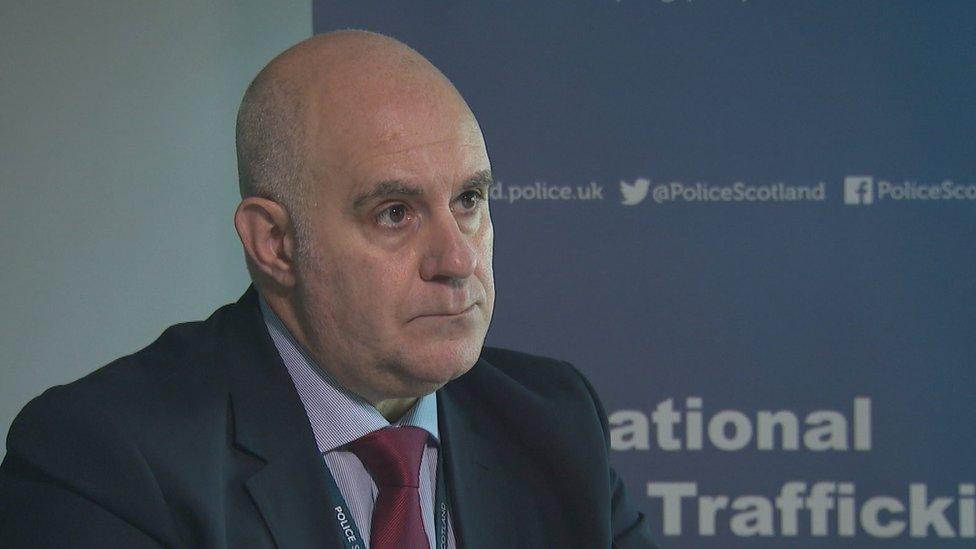
Det Supt Capaldi said Jagpal Singh didn't really care about humanity and sought to line his own pockets
Det Supt Fil Capaldi, who runs Police Scotland's National Human Trafficking Unit, told BBC Scotland: "Breaking it right down, Jagpal Singh exploited women for financial gain.
"He didn't care what happened to them, he didn't care what they had to do for the money so that he benefitted from that activity.
"Painting Jagpal Singh in any way other than somebody who didn't really care about individuals, didn't really care about humanity and sought to line his own pockets.
"That's probably a more accurate depiction of the kind of individual that he is."
Modern slavery
This year has seen potential victims of human trafficking rise to record levels.
By the start of December, about 600 individuals were identified to authorities through the Home Office's National Referral Mechanism (NRM).
It is the highest number since the system - used to help victims of modern slavery in the UK - was introduced in 2009.
Det Supt Capaldi said the number dipped during the Covid pandemic but this year had already passed the 2019 high.
Across the UK, the NRM has seen a seven-fold increase in modern slavery referrals since 2014.
Until this year, the highest number of referrals reported for Scotland was 512. More than half of them were involved labour exploitation, the most common type of slavery in Scotland.
Det Supt Capaldi said the bulk of his unit's work involves forced labour or victims being coerced into criminal enterprises such as cannabis cultivations.
"It is predominantly labour exploitation, or exploitation for forced criminality, then followed by sexual exploitation," he said.
However, victims of sex trafficking have also been on the rise.
Last month, Trafficking Awareness Raising Alliance (TARA) told the BBC it had seen 93 referrals between April and September this year.
That compares with 95 women for the whole of 2020-21 and 120 women for 2021-22.
Det Supt Capaldi said: "Some are hiding in plain sight. There are a number of cases we've had recently where members of the public have seen comings and goings at a strange hour, or seen a steady stream of men going to a particular door, and they've called that in.
"That might be the one piece of information that we are looking for around a particular group we are looking at."
Foreign victims
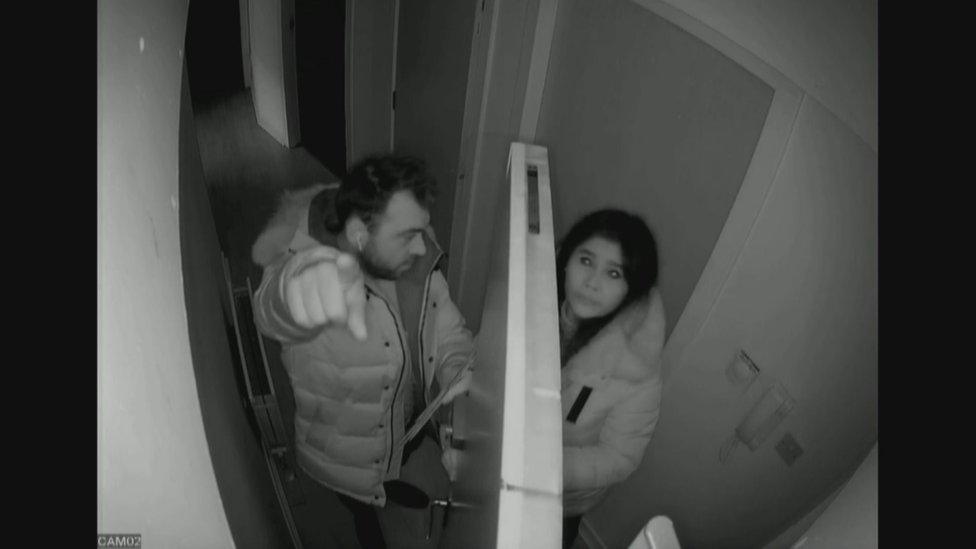
Vlassis Ntaoulias and Boonsong Wannas were also convicted of human trafficking
Across all trafficking to Scotland, Vietnamese nationals account for the highest numbers, followed by Albanians and Iranians.
Det Supt Capaldi said foreign victims "may have entered the UK in search of a better life, in search of better opportunities" but found themselves trapped by gangs.
He said: "You land on the ground, you don't know anybody, you don't have any means of income, and very quickly you are drawn into these groups who will exploit you to undertake criminal enterprises on their behalf."
Police Scotland recently started a joint investigation with police in Hungary in order to target an organised criminal gang working on Scottish soil.
Det Supt Capaldi said the gang are "a Hungarian crime group involved in trafficking women for the purposes of sexual exploitation and laundering money".
He said: "Most recently we were in Budapest to discuss the nature of the case and how we can work effectively together to combat this crime group.
"Whether that happens in Hungary, the UK or specifically here in Scotland, we agree a tactical plan to try to bring down that group and rescue some of the women involved."
It follows similar collaborations with forces in Romania, Albania and Lithuania, where suspected sex trafficking victims are identified on flights into Edinburgh or Glasgow.
"We realised very quickly that there is a real international dimension to everything that happens here," he said.
"It is really important for us to build those international liaisons. What happens here resonates across the continent as well.
"That's why from a law enforcement perspective we join the dots and can't work in isolation."
Related topics
- Published10 November 2022
